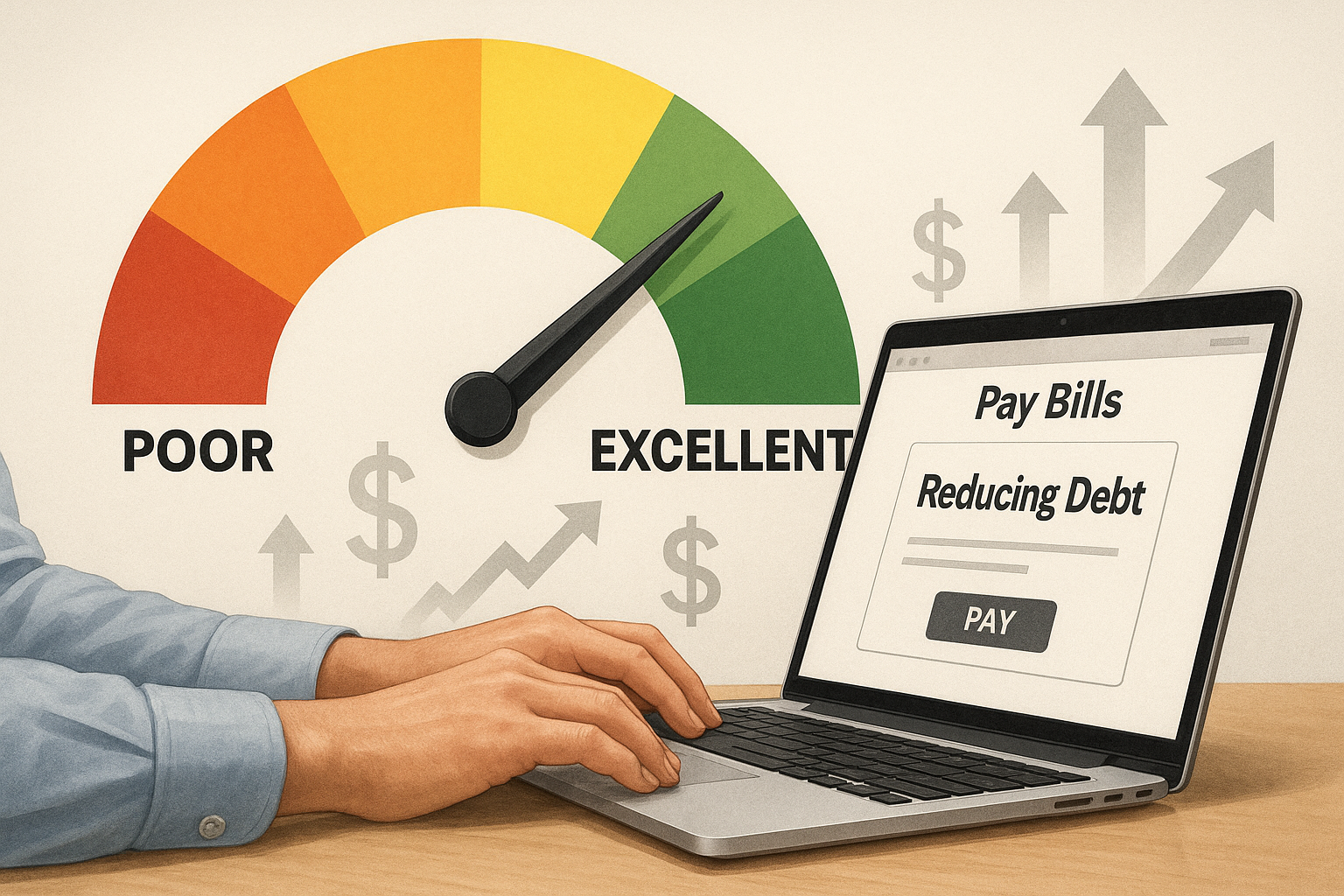Table of Contents
Introduction: Why Your Credit Score Matters
Your credit score is more than just a number—it’s a snapshot of your financial health. Lenders, landlords, and even some employers use it to judge your reliability. A higher score means:
- Lower interest rates on loans and credit cards
- Higher chances of approval for mortgages, auto loans, and rentals
- Better financial flexibility when you need it most
But here’s the good news: improving your credit score doesn’t have to take years. With the right strategies, you can see noticeable results in just a few weeks or months. This guide breaks down practical, step-by-step tips to improve your credit score fast.
How Credit Scores Work
Credit scores are typically calculated by FICO or VantageScore, ranging from 300 to 850.
Factors that affect your score:
- Payment history (35%) – On-time payments matter most
- Credit utilization (30%) – How much of your available credit you’re using
- Length of credit history (15%) – Older accounts boost scores
- Credit mix (10%) – Variety of credit (loans, cards) helps
- New credit inquiries (10%) – Too many applications hurt your score
Quick Tips to Improve Your Credit Score
1. Pay Bills on Time – Every Time
Your payment history is the single biggest factor. Even one missed payment can drop your score significantly.
💡 Tip: Set up autopay for at least the minimum amount due to avoid late fees.
2. Lower Your Credit Utilization Ratio
Your credit utilization ratio is the percentage of credit you’re using compared to your limit.
Example:
- Credit limit: $10,000
- Balance: $6,000
- Utilization: 60% (too high)
👉 Keep utilization below 30%—ideally under 10% for the best score boost.
3. Pay Down Credit Card Balances Strategically
Target high-interest credit cards first, but also spread payments to reduce overall utilization.
💡 Pro Tip: Make multiple small payments throughout the month instead of just one. This keeps balances low when credit bureaus report.
4. Dispute Credit Report Errors
Mistakes happen. According to the FTC, 1 in 5 credit reports contains errors that may lower your score.
Steps:
- Request free reports at AnnualCreditReport.com
- Review carefully for incorrect balances, duplicate accounts, or fraudulent activity
- File disputes with Experian, Equifax, or TransUnion
Correcting errors can improve your score quickly.
5. Ask for a Higher Credit Limit
If your spending habits are under control, request a credit limit increase.
- Old limit: $5,000 with $2,000 balance (40% utilization)
- New limit: $10,000 with $2,000 balance (20% utilization)
This instantly lowers your utilization ratio and boosts your score.
6. Become an Authorized User
If a trusted family member has a long history of on-time payments and low utilization, ask to be added as an authorized user on their card.
👉 Their positive history helps improve your credit profile.
7. Don’t Close Old Accounts
Closing accounts shortens your credit history and increases utilization. Keep old accounts open, even if unused.
8. Diversify Your Credit Mix
Lenders like to see you can handle different types of credit. A mix of credit cards, auto loans, and personal loans can help.
💡 But don’t take unnecessary loans just to diversify—apply strategically.
9. Limit Hard Inquiries
Every time you apply for new credit, a hard inquiry is recorded, lowering your score by a few points.
👉 Space out applications and only apply when necessary.
10. Use Experian Boost or Similar Tools
Services like Experian Boost allow you to add utility bills, rent, and streaming subscriptions to your credit file.
- Free to use
- Can improve thin credit histories
- Works best if you already pay bills on time
Comparison Table: Fastest Ways to Improve Your Credit Score
| Method | Speed of Impact | Effort Required | Potential Score Boost |
|---|---|---|---|
| Pay bills on time | 1–2 months | Low (autopay) | High |
| Lower credit utilization | 30–60 days | Medium | High |
| Dispute credit report errors | 1–3 months | Medium | Medium–High |
| Request credit limit increase | Immediate–1 mo | Low | Medium |
| Become authorized user | 1–2 months | Low | Medium–High |
| Avoid new hard inquiries | Ongoing | Low | Low–Medium |
Long-Term Strategies for Lasting Results
While the tips above can boost your score quickly, maintaining a high credit score requires consistent habits:
- Monitor your credit reports yearly
- Keep balances low across all accounts
- Build an emergency fund to avoid missed payments
- Use credit responsibly without overspending
Frequently Asked Questions (FAQs)
1. How fast can I raise my credit score?
You can see improvements in 30 to 90 days depending on actions taken.
2. Does paying off all debt instantly boost my score?
It helps, but the effect depends on your overall credit profile. Reducing utilization often shows faster results than closing accounts.
3. Is it bad to check my credit score often?
No. Checking your own score is a soft inquiry and does not hurt your credit.
4. Can bad credit be fixed permanently?
Yes—with consistent on-time payments and responsible credit usage, most negative marks fade after 7 years.
Outbound Links (Helpful Resources)
- AnnualCreditReport.com – Get free credit reports
- Consumer Financial Protection Bureau – Official U.S. government financial advice
- Experian Credit Education – Learn about credit scoring
📌 Inbound link suggestion: Link internally to your blog on Debt Consolidation vs Debt Settlement if you have one.
Conclusion: Small Steps = Big Credit Gains
Improving your credit score fast is possible when you know which levers to pull. Focus on:
- Paying bills on time
- Lowering utilization
- Correcting errors
- Requesting higher limits
- Using authorized user accounts
By combining short-term hacks with long-term habits, you’ll unlock better loan rates, stronger financial credibility, and more freedom to achieve your goals.
👉 Start today—the sooner you act, the faster your score climbs.
Please check more blogs here.

